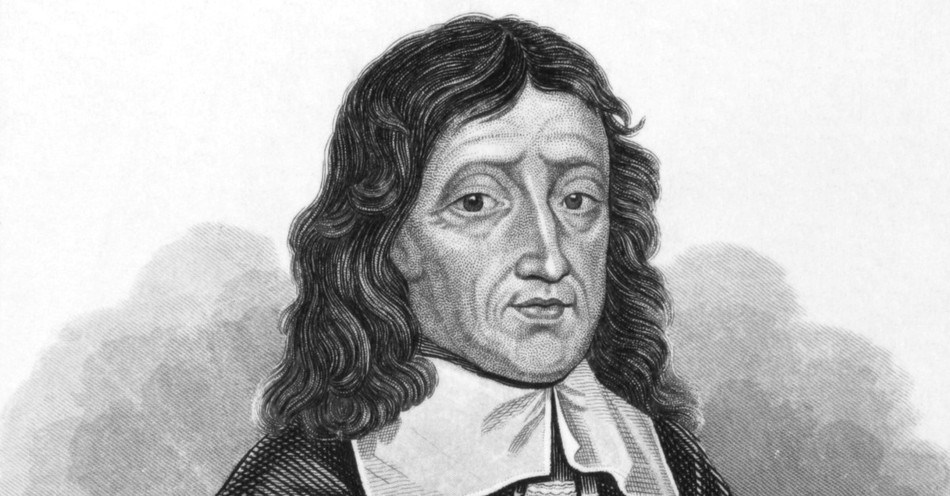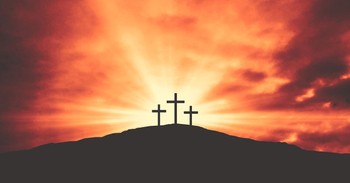If you have heard of John Milton, you may easily say, “Oh, I read Paradise Lost in college!” No doubt you have, like many college students at religious institutions. While this great epic poem has had a long-lasting impression on Christians, John Milton was known for more than his poetry. He was also a political man who challenged Christians and secularists alike.
So, what shaped John Milton? How did he become the man we remember today?
What Happened in John Milton’s Early Life?
Born in early December 1608, John was the second of three children. Though the English Civil War did not begin for another 30-40 years, he was raised in an environment that continued to grow hostile between Anglicans (The Church of England) and Puritans, with Roman Catholics caught in the middle. Milton’s grandfather was a devout Catholic who renounced his son John, Milton’s father, for reading the King James translation of the Bible.
Growing up, Milton was privately tutored at St. Paul’s School and even heard sermons by another famous English poet, John Donne. He went on to Christ College, Cambridge, in 1625, learning arts and music (especially poetry) and multiple languages (including Hebrew, Latin, Italian, French, and Greek). His education took some time due to being temporarily expelled based on conflict with his tutor, William Chappell.
Upon his return, Milton attempted but failed to enter ministry in the Anglican Church. Various difficulties caused the problem. He sympathized more with the Puritan movement than the Anglican structure. Cambridge’s focus on scholastic education rather than arts and imagination increased his divide with the Church of England. Despite these problems, he became well-known at Cambridge for his oratorical performances—such as speech, debate, and rhetorical theory.
Milton took a 15-month trip abroad after completing his Cambridge studies.
How Did Politics Change John Milton’s Life?
By the time Milton returned to England in 1639, England was on the brink of civil war. The conflict had many factors, but a key moment came in 1626, when Charles I replaced his father, King James I. Shortly after becoming king, Charles expelled Parliament and ruled the British Isles on his own for 11 years. The Bishop’s War began in 1639, with Scotland (particularly its Presbyterian Church) opposing his measures.
By the time the English Civil War broke out in 1642 between the Royalists and Parliamentarians, Milton had become closer to the Puritan movement and more distant from the Church of England and the monarchy. He criticized the monarchy. He criticized the Church of England for looking too much like the Roman Catholic Church and its ties to the monarchy. While some of his writings took a different side—in The Reason of Church Government, he says he prefers Scottish Presbyterianism to Anglicanism. However, Milton became increasingly more critical of Presbyterianism over time, finding it just as rigid as the Anglican Church.
Milton’s staunch pro-republic and anti-monarchy views and his defense of intellectual liberty appeared in various books and essays. Similar to Dante Algieri, he critiqued the system in nonfiction essays while providing other critiques in his fiction and poetry. Many of his views can still be read in his Commonplace Book.
Intellectual liberty became a key concern for Milton and many more people. Censoring writing and monitoring public talk became common during the English Civil War. In his work Arepoagitica, Milton openly wrote against censorship, arguing it was up to the people to choose what they could and would read rather than being told what to read and how to read it. He also promoted Scripture being available and accessible to all people, not just church leaders or politicians. Furthermore, he warned of the church and Christians getting too involved in political affairs and even pushed for a separation of church and state.
His personal life made Milton more controversial: John Milton was divorced twice and married three times. In his works The Doctrine of Discipline and Divorce (1643) and The Judgment of Martin Bucer Concerning Divorce (1644), Milton argued against a husband and wife being bound together by law without the freedom to separate. He suggested that divorce be a private matter and that it could be possible on mutual grounds.
As the war raged on, Milton openly stated that Charles I of England should be deposed, even executed, for his lack of rulership and the continuation of the war. Milton said those who supported the monarchy were “slaves within doors”—blind and accepting the status quo rather than recognizing that the past system doesn’t always work. Milton would have his way regarding his views on the king. On January 30, 1649, Charles I was executed by beheading.
Here, the Puritan Oliver Cromwell enters the story. His government temporarily ruled England and hired Milton as Secretary of Foreign Tongues. Milton and Cromwell continued to write, speak, and publish work supporting the Puritan government until Charles II returned from exile. As Charles II came to power, Milton and Cromwell went into hiding.
Despite circumstances, Milton published his greatest work, Paradise Lost, which Dan Graves covers below.
How Did Paradise Lost Become a Classic?
Dan Graves looks at what happened the day that Milton sold his completed epic, not knowing it would change Western literature:
“This date is preeminent in literature for one transaction. On this day, April 27, 1667, Milton sold the most magnificent epic in the English language, conveying the rights for Paradise Lost to Samuel Simmons.
Although the author was well-known, the sale roused little notice and the book went for a pittance, nor was there any urgency to get it through the press. Paradise Lost was not be published until August 20. Despite this inauspicious start, it would become ranked by many next to the Bible.
The blind poet’s lofty narrative required twelve books to tell. He dealt with the highest dramatic events known to us: the rebellion of Satan and the fall of man, both of which he accepted as literal facts. He shows Adam and Eve naive of evil and delighted with the garden of Eden; their sin and consequent woe; and God’s promise of eventual restoration of all things through Jesus Christ.
Milton presented his epic in blank verse, knowing that rhymes would make it trite and weary the ear in that vast span of words. The majesty of iambic pentameter would best suit his conception. Theological truths which would not easily bear rhyme would work well with an unobtrusive alliteration. For example, God says of Adam and Eve:
‘. . . they themselves decreed
their own revolt, not I. If I foreknew,
Foreknowledge had no influence on their fault.’
It is remarked that Milton achieved his finest effects depicting the rebel Satan. A Puritan, Milton participated in the revolt against Charles I. No doubt this helped him frame the sentiment he ascribed to Satan: ‘Better to reign in Hell than serve in Heav’n.’ Try as he will to pervert God’s purpose, however, Satan is ultimately thwarted; evil is transformed by God into the means for good.
‘Who seeks to lessen thee,
against his purpose serves
To manifest the more thy might: his evil
Thou usest, and from thence creat’st more good.’
To write such lines, Milton must have meditated long on Joseph’s words to the very brothers who had sold him into slavery: ‘You intended it for evil, but God meant it for good, for the saving of many lives.’
This work of unparalleled genius earned Milton £5 with promise of £5 more at publication and £5 for each reprinting. According to the agreement entered that April day the number of copies to be printed with each impression was limited. ‘[The] impression shall be accounted to be ended when thirteen hundred books of the said whole copy, or manuscript imprinted shall be sold or retailed off to particular reading customers. . .’ Millions have sold since.”
(“Milton’s Ten Pound Epic” by Dan Graves, MSL, first published on May 3, 2010)
What Happened to John Milton After Paradise Lost?
Due to the popularity of Paradise Lost, Milton wrote a follow-up, Paradise Regained. Echoing the Book of Job and the temptation of Christ in the wilderness, Milton focuses on Christ being victorious and Christian heroism as Christ in the story refutes Satan’s arguments and reasons for his temptations.
Milton included another work in the published manuscript of Paradise Regained: Samson Agonistes, which focuses on the final days of Samson, as seen in the book of Judges. Here, Milton focuses on Samson’s view of the situation and provides an interesting interpretation: Samson as a man struggling with depression.
In his later years, Milton experienced suffering. Charlies II became king in 1660, and Milton was briefly put on trial and imprisoned for his involvement with Cromwell. He nearly faced public execution but was eventually pardoned. He lived a quieter life afterward, publishing smaller works and not much on politics—except for Of True Religion, which argued for religious liberty. The full story of his death—including the exact date and the cause—is unknown. Historians believe he passed away in November 1674.
Milton’s life and legacy were both revolutionary for his time. Not all Christians agree with his criticisms of established churches. Many would also disagree with his general justification for divorce, arguing it should be limited to specific circumstances (such as infidelity or abuse). Still, he advocated for all people to have access to Scripture—an idea that played a prominent role in the Protestant Reformation.
Who Are Some Christian Writers that John Milton Influenced?
Milton’s work not only survived but was praised and continues to be praised centuries later.
Notable people who have praised his work include philosophers Voltaire and Edmund Burke and literary critic Joseph Warton.
His work went on to inspire poets like George Eliot and Thomas Hardy. Sometimes, his work generated more complicated responses. T.S. Eliot dismissed studying Milton as a hindrance in his 1936 book On Poetry and Poets, then praised Milton in 1946 and observed that Milton’s work inspired some passages in The Wasteland.
His work has also inspired a variety of novelists and artists in other mediums. For example, C.S. Lewis’ science fiction novel Perelandra references many images and ideas from Paradise Lost in its story about a Garden of Eden situation on another planet.
Dan Graves’ Bibliography:
1. Bagehot, Walter. “John Milton.” Literary Studies. London: J.M. Dent, 1911.
2. Chateaubriand, François-Réné. The Genius of Christianity: or, The spirit and beauty of the Christian religion; Translated by Charles I. White. Philadelphia: Lippincott, 1856. See the chapter on “Paradise Lost.”
3. Collins, Rowland L. Fourteen British and American Poets. New York: Macmillan, 1964. pp. 54 - 75.
4. Gehring, Albert. The Religion of Thirty Great Thinkers. Boston: Marshall Jones, 1925.
5. Lewis, C.S. A Preface to Milton’s Paradise Lost. London; New York: Oxford University Press, 1961.
6. Macaulay, Thomas Babington. Essays on Milton and Addison. Edited for school use by Thomas Marc Parrott. New York and Chicago: Globe School Book Company, 1901.
7. Milton, John. Paradise Lost. Various editions.
8. “Milton, John.” Dictionary of National Biography. Edited by Leslie Stephen and Sidney Lee. London: Oxford University Press, 1921 - 1996.
9. “Milton, John.” Kunitz, Stanley L. British Authors Before 1800; a biographical dictionary. New York: H. W. Wilson, 1952.
10. “Milton, John.” The Oxford Dictionary of the Christian Church. Edited by F. L. Cross and E. A. Livingstone. Oxford, 1997.
11. “Milton, John.” Webster’s New World Companion to English and American Literature. New York: Popular Library, 1976.
12. Ruoff, Henry W. Masters of Achievement; the world’s greatest leaders in literature, art, religion, philosophy, science, politics and industry. Buffalo, New York: The Frontier Press Company, 1911.
12. Thorpe, James, Editor. Milton Criticism; selections from four centuries. New York: Rinehart, 1950.
13. Untermeyer, Louis. “Blind Visionary: John Milton.” Lives of the Poets. New York: Simon and Schuster, 1959.
14. Wells, Amos R. A Treasure of Hymns; brief biographies of 120 leading hymn-writers and their best hymns. Boston: W. A. Wilde company, 1945.
Last updated April, 2007.
Photo Credit: © Getty Images/GeorgiosArt

This article is part of our People of Christianity catalog that features the stories, meaning, and significance of well-known people from the Bible and history. Here are some of the most popular articles for knowing important figures in Christianity:
How Did the Apostle Paul Die?
Who are the Nicolaitans in Revelation?
Who Was Deborah in the Bible?
Who Was Moses in the Bible?
King Solomon's Story in the Bible
Who Was Lot's Wife in the Bible?
Who Was Jezebel in the Bible?
Who Was the Prodigal Son?





